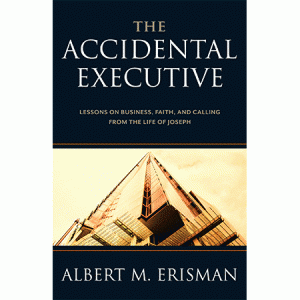Read the first part of Romal Tune’s interview with Al Erisman here. Reprinted with permission. This interview originally appeared at the Huffington Post.
RT: In The Accidental Executive you share a lot of life lessons. What are two or three of the most important life lessons you learned as a business leaders and Christian?
One is the role of leadership. As a leader, it is not about you, but about serving others. Second, our work is not about the  titles, perks, or money, but about delivering value. Third, our work needs a bigger purpose that makes a difference. Our work is not just about getting by, but has a purpose from God in this world. Joseph learned these lessons. He spoke a bit too boldly about his dreams early on, thinking the promise of his dreams would lead him to authority and power. But time in slavery and in prison put him in a position to serve others, even while in slavery, in prison, and ultimately when he had power beyond any we could imagine. At the end, he recognized the call of God when he told his brothers, “You intended this for evil, but God intended it for good, for the saving of many lives.” In developing these points I was reminded of times when I found a way to do these things, and times when I did not. These are challenging lessons that are never finally learned.
titles, perks, or money, but about delivering value. Third, our work needs a bigger purpose that makes a difference. Our work is not just about getting by, but has a purpose from God in this world. Joseph learned these lessons. He spoke a bit too boldly about his dreams early on, thinking the promise of his dreams would lead him to authority and power. But time in slavery and in prison put him in a position to serve others, even while in slavery, in prison, and ultimately when he had power beyond any we could imagine. At the end, he recognized the call of God when he told his brothers, “You intended this for evil, but God intended it for good, for the saving of many lives.” In developing these points I was reminded of times when I found a way to do these things, and times when I did not. These are challenging lessons that are never finally learned.
RT: Many employees find themselves suffering from the “Monday Morning Blues”, a state of mind that is often symptomatic of a lack of enthusiasm, passion, meaning, value or finding purpose in the work that they do. As a result, Mondays (workdays) are dreaded.
• How does one find or deal with purpose in our work?
• How important is discovering one’s purpose in light of work? (personal and world impact)
One of the business leaders I quote from in the book, Barry Rowan, makes the point, “We don’t find meaning in our work, but we bring meaning to our work.” It is important we view our work beyond the particular task to see its impact and how we can contribute to that impact. One of the challenges in trying to discover one’s purpose, is that we believe it comes from our work. Further, we must recognize that many of the people in the world have little choice about what they can do. Joseph was one of these people, yet he saw the purpose in his work. Another leader reminds us that if we are constantly waiting for the perfect thing, we miss what we can contribute where we are. Make a difference where you are. It doesn’t mean you must remain stuck, but while you are there, do the work well, and identify how that work contributes to a bigger purpose.
RT: In what ways can Christians begin to see the marketplace as a “scaling opportunity” to affect positive social change; i.e., in terms of economic impact in addressing issues of joblessness, poverty, instilling value/dignity in persons, and for human flouring and affecting the wider culture?
As we have studied the Bible to look for the role of work in our whole lives, we see two quite different purposes: developing capability that carries on what God began with the creation. This involves creating products and services that bring value, dignity, and opportunity to our communities. The second type of work, because of the brokenness of our world, is to do work that helps overcome the ravages of this brokenness. Again, Joseph’s work had both of these characters. The logistics system he put together for the 14 year project was a creative marvel. But he was saving people from the ravages of famine at the same time. When Christians see their work as meaningless except for the paycheck, they miss all of these opportunities. Bill Pollard, former CEO and chairman of ServiceMaster, helped the people doing the dirty job of cleaning hospitals see the role they had in helping the patient get well. It was more than the task, and more than the paycheck.
RT: What roles do money and business play in the work of ministry? I ask because, I sometimes find that in some circles Christians talk about money like it’s a bad thing and in others, people with money downplay that fact that they have it in order to avoid being judged harshly by others.
I need to clarify your definition of ministry. There is a common view that ministry is within the church, but I have come to believe we are all ministers, and I tend to use the term ministry in its broadest sense. But I certainly understand the issue you are raising. Money has a distorting capability. Both the Scripture (the love of money is the root of all kinds of evil) and psychology (Daniel Khaneman in Thinking Fast, and Slow, says that money makes us isolated and selfish) teach us this. When we see someone with money (more than we have, a relative thing) we either elevate them, envy them, or put them down. Money is a tool, and we cannot become servants to our tools. In the same way, I would suggest that when a business focuses only on money it can distort purpose, decisions, and everything about the business. This is a much longer subject, but we can also tie this back to the Joseph story. When Joseph came into fortune through his big promotion, he needed to take some deliberate steps to keep this fortune from taking his eye off of the goal. In general, he seemed to handle this well and provides a model for dealing with success.
RT: What do you think is required for non-religious business institutions and the faith community to find common ground?
There are many places of common ground. As Christians in business, we need to be careful about how we take our faith to work. It is not the place for proselytizing. But the principles we have already discussed including purpose, fairness, treating others with respect, honesty, transparency, diligence are all deeply rooted in our faith, and a place for common ground with others. There is one other point here. As Christians we can understand the tension between the goodness of our work (God created humankind to work before sin entered the world) and the brokenness of our work. So it should enable to do our work in the presence of both purpose and challenge.
RT: What do church leaders have to offer the business community that would be welcomed and not make them feel like we are proselytizing or making them feel judged?
All of the above practices are a part of this answer. But perhaps another dimension of this question is how pastors can better equip the business people their congregations. Thus pastors need to understand and communicate the purpose and calling of work in the marketplace. The pastor can play an important role in encouraging or discouraging marketplace people in the congregation. Don’t expect the pastor to become a business consultant, but do expect engagement and support. Business people likewise should encourage and support their pastors in their work.
RT: How can faith community leaders learn to better communicate with the business community? One of the lessons that I learned from you and your son Michael, is that when speaking to the business community it’s important to know which “religious” words translate and which words do not when speaking to potential business allies. Understanding the language or communication style of the business community is critical to creating cross sector networks. In The Accidental Executive you did an excellent job of making this a book understandable for people of faith and people in business who may not identify with the Christian narrative but can identify with the story.
Psychologists talk about something called “Theory of Mind,” working to understand something in the language of another person. Every community develops its own lingo that is totally incomprehensible outside that community, and it breaks down communication. Christians suffer from this as well. Really getting to know another person allows you to communicate with them in their language. Joseph dealt with this early in his life when he told his brothers of his dreams of leadership. He wasn’t considering how they would hear the message. Later, after time in slavery and in prison, we see he learned this lesson. His communication with Pharaoh was brilliant in looking at the situation from Pharaoh’s point of view. It is amazing to see that after 13 years in slavery and in prison he said nothing about his own situation, and focused on Pharaoh’s problem. We need to work at this, and it is not easy.
RT: Thank you Al for taking the time to do this interview. Are there is final thoughts you would like share?
Once I started reading this story as the story of a career, I was amazed how many lessons popped out that are relevant to 21st century business. We’ve have talked about many, but here are a few more. Like us, Joseph had an education that was helpful but he also was taught some things that he had to unlearn. His approach to strategy seemed remarkably like what is taught in business school today. Joseph had to deal with difficult bosses and had to learn good “upward communication.” By the end he did very well. Taking bad news to a boss, for example, is challenging today, and something Joseph had to learn. There are some things I would like to ask Joseph about that are not in the text. I tried not to speculate, but I couldn’t resist the temptation to prepare some questions for him. I included these in the last chapter.
RT: The Accidental Executive is a great book that shares an amazing journey. I highly recommend it. You can purchase it here.
Image:Pixabay.













